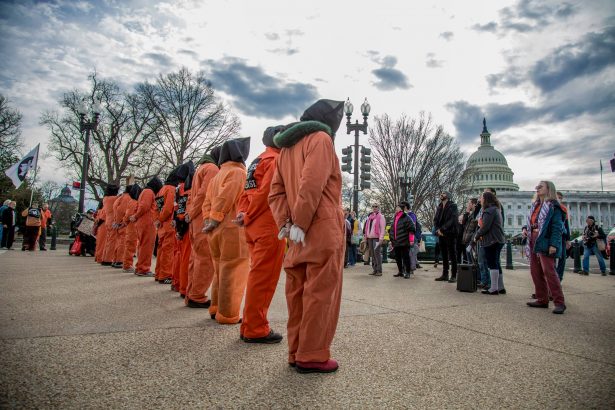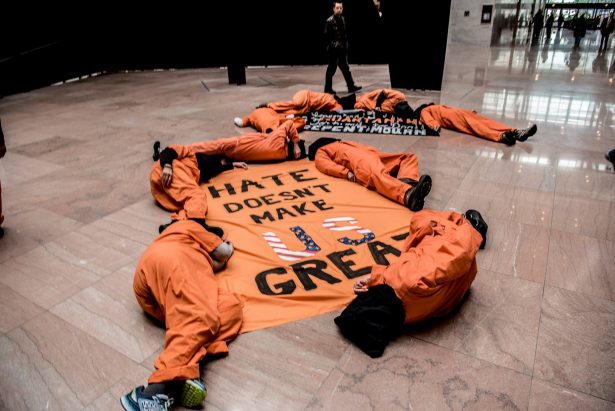
The Pentagon loomed over us, its marble absorbing what little early morning sunlight was peaking over the vast parking lots. It was still dark where we stood, a line of orange jumpsuits and banners, trying to keep warm. There was a policeman who kept leaning over the protest pen rail to tell us to keep our faces visible. He was “nice,” while his colleagues were further back and on the roof, armed with big guns and expressionless faces.
Our voices and our street theater about the lasting stain of torture and indefinite detention at Guantánamo seemed tiny, few and feeble and were confined within the pen — a stretch of frozen grass beside the pedestrian walkway, where hundreds of people streamed by, their IDs at the ready, to be swallowed by the Department of Defense on Monday morning.
Some employees, however, paused or slowed to take in our message. A few nodded and covertly filmed us with their smart phones as they walked by. I focused on this. It warmed me: their eye contact and their subtle resistance.
I tried to imagine their work lives as the cold snaked through my mitten to chill my banner-holding hand. Very few looked happy. But who would be happy on a Monday morning heading into work at 7:15 in the bitter cold after a long commute past a line a 30 people dressed in orange jumpsuits?
I was in Washington, D.C., for the Witness Against Torture Fast for Justice, marking the period around January 11, when in 2002 the first prisoners were brought to the Guantanamo Bay U.S. Naval Base in shackles. Every year we have tried to draw attention to this day, reminding the American people of the illegal torture and abuse being perpetrated against Muslim men in the name of our security — Muslim men who have not been charged with any crime.
We have been doing this since returning from a sojourn to Guantánamo in 2005, to fast and vigil as close to the U.S. base as we could get. We broke the travel restrictions then in place against Cuba in the hopes that the Bush administration would prosecute us and give us a platform to mount a case against Guantánamo. Denied that chance, we have been gathering in Washington every January (and other times too) to witness and march, pray and reflect, learn and connect.
It is always hard and a little lonely to be an activist for justice and compassion. Nevertheless, with the Trump presidency looming as dark and cold as the Pentagon that Monday morning, I was feeling acutely lonely. I was also coming to D.C. by myself for the first time since 2012. My husband convinced me that the only thing worse than fasting, than demonstrating for the better part of a week, than standing in the cold for an hour and a half in the bitter cold dawn at the Pentagon was doing all that with a two-year-old and four-year-old in tow. So, I went gratefully solo to immerse myself in the experience, and to be a participant in a movement I helped form.
Politically, the moment is dark. Despite his pledges on the campaign trail, and an executive order banning torture and committing to close Guantánamo, the Obama White House did not shutter the prison. While we were in D.C., there were 55 men imprisoned at Guantánamo (down from 779 at its height), each man at a cost of more than $7 million a year to U.S. taxpayers. Nineteen are cleared for release. There are 26 “forever prisoners.” The United States has evidence against these men, but it was extracted through torture and thus inadmissible. Still, they have been deemed too dangerous to be let loose into the world again. And then there are 10 men actually charged with crimes, who are also the victims of torture at the hands of U.S. agents (or by third parties at the direction of U.S. agents) and moving through a military commissions legal process so slow and suspect that they are likely to be forever prisoners as well.
Donald Trump would like to fill Guantánamo and expand its capacity to hold “bad dudes,” including American citizens.

Part of Witness Against Torture’s work in Washington, D.C. this year was to infiltrate the confirmation hearings of Jeff Sessions, who is Trump’s pick for Attorney General. The Alabama senator told the committee that the prison should be kept open and continue to hold “alleged terrorists,” saying “it’s designed for that purpose, and it fits that purpose marvelously well. It is a safe place to keep prisoners.”
It was not safe for the nine men who died there, seven in apparent, but suspicious suicides — one of a heart attack and one from cancer. Scott Horton’s exhaustive investigative report for Harper’s Magazine all but declares that three of those men were tortured to death in June 2006, a fate only narrowly escaped by Shaker Aamer — who was freed from Guantánamo in October 2015. It was not safe for the hundreds who engaged in hunger striking to protest their detention and mistreatment and were violently subjected to force-feeding regimes. It was not safe for the many men who have been released and who continue to bear the physical and psychological scars of their ordeals. And it is not safe for us, the American people, who are being made complicit in torture and abuse of Muslim men held outside of the law.
Since we learned about the horror of Guantánamo more than a decade ago, we have been saying in as many ways as we can: Guantánamo makes the world unsafe. And, so again, on January 11, 2017, we gathered in the Senate’s Hart Office Building, as the confirmation hearings for Sessions and other Trump administration’s picks were taking place. We laid banners on the floor of the building’s dramatic and soaring atrium and called for the senators, officials, citizens and staffers to mourn the nine who died at Guantanamo. Nine members of our group were dressed in orange jumpsuits and black hoods, and they laid down around banners that read “Hate doesn’t make U.S. great” and “Remember: Nine men died at Guantánamo, thee tortured to death. Repent and mourn.” We sang as two others from our group dropped a banner from an upper floor, with the message “No torture cabinet.” As those of us not risking arrest sang our way through the halls, Massachusetts Sen. Elizabeth Warren met our eyes and gave us a thumbs up.
Sessions’ confirmation hearings were interrupted multiple times by creative and courageous activists — some of whom dressed in Klu Klux Klan outfits and mockingly saluted a man who has a long track record of racist statements and policy stances. As one of our activists was led out of the hearing room shouting “No torture, shut down Guantánamo,” and holding a fabric sign, California Rep. Barbara Lee broke into a wide smile.
The senator’s thumbs up. The representative’s smile. The eye contact from Pentagon employees. The honks and waves of people on the streets of D.C., as they passed our vigils and marches. The friendships we have built with lawyers, artists, civil rights activists, human rights advocates, people working on these issues from every different angle. That is enough to keep us going. We have to keep going.
We will be at the Trump inauguration. We will be in D.C. in June to support the Torture Abolition Survivor’s Support Coalition’s work. We will continue to explore the places where Guantánamo intersects with Black Lives Matter, with issues of mass incarceration, torture and indefinite detention in the United States, with the civil and political rights of Muslim Americans and immigrants, and with other issues of justice.
This is enough to keep us going. This and the messages we receive from the men at Guantánamo. Ghaleb Nasser Al Bihani, a Yemeni man who was cleared for transfer in 2014, is a talented artist who says he is painting the life he wants to see someday. He told us: “I have a bright vision of my future.” I think that is because he knows people in this country know his name.
Alright, Trump. We are ready for you.

Thanks, Frida, for your ongoing witness. So happy for the 10 more today who got out of Guantanamo and went to Oman. Hopefully the others who have been cleared for release will also get out this week.
Susan McLucas
Boston
Thank you, Frida.
I am grateful for WAT’s actions and fidelity to keeping the voices of the men who have been and still are in Gitmo at the forefront of our awareness. A powerful ‘witness’ indeed to me and so many.
Thank you Frida! And see you in the streets.
To Frida Berrigan, I just read your article on “The New Patriots” movement of we the 99% who are technically politically “homeless” within the corrupted rigged USA gov establishment systems… We have been all my life of 72 years and voting for 50 years. Ralph NADER taught us how the two headed snake of GOP/DEM did not allow real democracy ever! I am a little ol’ lady been activist anti-war/pro-human needs and environment all my life. Your family were great inspiration to many of us and always will be greatly respected!
I believe we are in the midst of worst mind numbing wars on words in USA politics ever accelerating war on truth and minds…literally destroying our language… What madness has wrought!
Patriotism pro war has dominated our nation and the global communities for way too long…burying the peace movement and looting $trillions and $quadrillions from our taxpayers treasuries and Social Security trust accounts for military defense intel surveillance HLS and illegal immoral bloody wasteful bloated totally unaccountable endless wars!
I myself cannot ever use the word patriotism to define my politics. USA fed gov politicos of patriotism are not supporters of women and children and I am an holistic women’s feminist and earth mother. I am a matriot.
OK look it up. Matriot. The real meaning of LOVE of state, family, nation
and Planet Earth home. What I submit is we form a People’s MATRIOTIC Party for peace, people and planet over profits. People’s of all ages, colors and genders… We are the people willing to fully challenge the gross unaccountable wasteful bloody military many layered budgets ripping off USA citizens for over 65% of our national budget!
Barbara Lee rep for CALIFORNIA…she is the ONLY WA, DC rep who voted against war on Afghan 2001 or IRAQ 2003… And has since produced LEGISLATIONS in WA, DC to demand an end to these endless bloody wars, and to demand full audits of all military/defense/Pentagon/
Intel/HLS/bloated bloody budgets of unaccountability for “missing” mega $trillions! We are dreamers and schemers for a real democracy which we have never built in America… BARBARA Lee is MATRIOTIC! Why doesn’t anyone but me ever mention her?! We need matriots millions upon millions of matriots… People willing to use the power of the word to rise up and revolt against sexism, misogyny, racism, child traffiking, rapists, incesters, toxic capitalism, wars endless wars! BERNIE and Warren cannot challenge the military… The big elephants and donkeys in the room
No! Watched them endorse trump’s military!
We need a new deal for education based on matiotic values. Help me expand on this! Patriotic politics or seeking reforming the weak broken corrupt to the core DEMS will never make socialist progressives peaceful peoples party platform function. Hell nobody is mentioning the fact that OBAMA gave our national elections in charge of Secret HLS… We learned vividly how corrupted rigged broken our entire screwed up elections are in 2016 grim horrors shows… It’s a rat’s nest mess with corruptible electronic voting machines and all the rest! Sanity tells us we have to clean up and radically reform elections or all our hard work exercising free speech is being held in the prisons of corruptions!